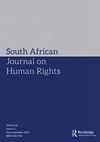Designing remedies for a recalcitrant administration
IF 0.3
4区 社会学
Q3 LAW
引用次数: 1
Abstract
Abstract This article concerns remedial design by courts in cases where constitutional rights are jeopardised by a recalcitrant administration. We focus on the recent judgment of the South African Constitutional Court in Bhekindlela Mwelase v Director-General for the Department of Rural Development and Land Reform – in particular its doctrinal innovation in appointing a Special Master to oversee the processing of labour tenant claims by the Department of Rural Affairs and Land Reform. We argue that the case raises both conceptual and practical questions about the relationship between rights and remedies, substantive law, and the separation of powers. We approach these questions after considering the judgment in its socio-political context through a consideration of the factors underlying the granting of the remedy, from both a theoretical and comparative perspective. The paper identifies a set factors that underpinned the Court’s decision that will be likely to influence the granting of invasive remedies in future cases. We then apply these factors to the judgment of the Supreme Court of India in the Right to Food Case to better understand the ways they play out in a different jurisdictional context. These factors can provide doctrinal and normative guidance for courts – especially in the so-called Global South – that often operate under conditions of chronic recalcitrance, inattentiveness, inaction, or incompetence of the coordinate branches of government.为顽固的行政当局设计补救办法
摘要本文讨论的是法院在宪法权利受到顽固行政当局危害的情况下的补救设计。我们的重点是南非宪法法院最近在bhekindela Mwelase诉农村发展和土地改革司司长一案中作出的判决,特别是该判决在任命一名特别主任监督农村事务和土地改革司处理劳工佃户索赔方面的理论创新。我们认为,该案件提出了关于权利与救济、实体法和三权分立之间关系的概念和实践问题。我们从理论和比较的角度,通过考虑给予补救的基本因素,在其社会政治背景下考虑判决后,处理这些问题。该文件确定了支持法院裁决的一系列因素,这些因素可能会影响在未来案件中给予侵入性补救措施。然后,我们将这些因素应用于印度最高法院在食物权案中的判决,以更好地理解它们在不同司法背景下的作用方式。这些因素可以为法院提供理论和规范指导-特别是在所谓的全球南方-这些法院经常在政府协调部门长期顽固,疏忽,不作为或无能的情况下运作。
本文章由计算机程序翻译,如有差异,请以英文原文为准。
求助全文
约1分钟内获得全文
求助全文

 求助内容:
求助内容: 应助结果提醒方式:
应助结果提醒方式:


